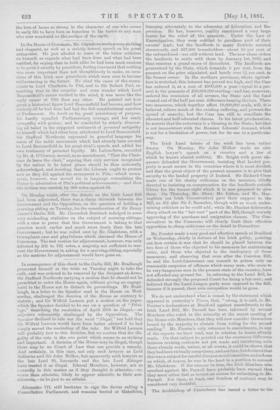In consequence of this check to the Oaths Bill, Mr.
Bradlaugh presented himself at the table on Tuesday night to take the oath, and was ordered to be removed by the Serjeant-at-Arms, Sir Stafford Northcote carrying a motion that he should not be permitted to enter the House again, without giving an engage- ment to the House not to disturb its proceedings. Mr. Brad- laugh, in a letter to the Speaker read in the House on Wed- nesday, challenged the decision of the House as contrary to statute ; and Sir Wilfrid Lawson put a motion on the paper, which the Speaker decided to be one on a question of "
describing the resolution of April 20th as illegal,—an adjective vehemently challenged by the Opposition. The Speaker declined to rule out the word "illegal," but hold that Sir Wilfrid Lawson would have been better advised if he had simply moved the rescinding of the vote. Sir Wilfrid Lawson will probably 'bow to this decision, but we confess that the ille- gality of the vote is the one point which seems to us striking and important. A decision of the House may be illegal, though there may bo no Court of Law that can provide a remedy. And certainly, in this ease, not only such lawyers as Lord Selborne and Sir John Holker, but apparently such lawyers as the late Lord St. Leonardo and the late Lord Abinger have treated it as illegal. Liberal Members, however, are as cowardly in this matter as if they thought it atheistic,—or, worse titan atheistic, likely to appear atheistic to their con- stituents,—to be just to an atheist.






































 Previous page
Previous page